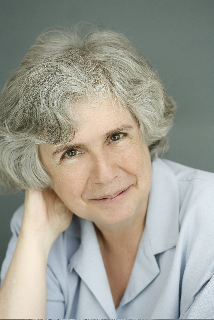Susan Gottesman
Susan Gottesman | |
|---|---|
 | |
| Born | 19 May 1945 |
| Alma mater | |
| Known for |
|
| Scientific career | |
| Fields |
|
| Institutions | |
| Thesis | (1972) |
Susan Gottesman is microbiologist at the National Cancer Institute (NCI), which is part of the National Institutes of Health (NIH). She is a pioneer in the area of biological regulation in which enzymes that destroy specific other proteins, called proteases, play a central role inside the cell. In groundbreaking work, she discovered and elucidated the central features of a whole new family of proteases that require energy for their function in the form of ATP-hydrolysis.[1]
Life
She was born on May 19, 1945, in New York. Her father was trained as an accountant and ran a company that made rotisseries and other small appliances. Her mother was a high school teacher and later became a guidance counselor.[1]
Dr. Gottesman received a B.A. in biochemical sciences, in 1967, from Radcliffe College, and a Ph.D. in microbiology from Harvard University, in 1972. She did her postdoctoral training from 1971 to 1974 in NCI's Laboratory of Molecular Biology. From 1974 to 1976, she was a research associate at the Massachusetts Institute of Technology, before returning as a senior investigator to NCI’s Laboratory of Molecular Biology. Today she is co-chief of that Laboratory and head of its Biochemical Genetics Section.[2]
Awards and honors
- Elected to the National Academy of Sciences in 1998.[3]
- Elected to the American Academy of Arts and Sciences in 1999.[4]
- Elected to the American Academy of Microbiology (AAM) in 2009.[5]
- American Society of Microbiology's (ASM) Abbott-ASM Lifetime Achievement Award in 2011.[6]
- Selman A. Waksman Award in Microbiology in 2015 for a major advance in the field of microbiology.[7]
Selected publications
- Battesti, A; Hoskins, JR; Tong, S; Milanesio, P; Mann, JM; Kravats, A; Tsegaye, YM; Bougdour, A; Wickner, S; Gottesman, S (15 December 2013). "Anti-adaptors provide multiple modes for regulation of the RssB adaptor protein". Genes & Development. 27 (24): 2722–35. doi:10.1101/gad.229617.113. PMID 24352426.
- Zhang, A; Schu, DJ; Tjaden, BC; Storz, G; Gottesman, S (9 October 2013). "Mutations in interaction surfaces differentially impact E. coli Hfq association with small RNAs and their mRNA targets". Journal of Molecular Biology. 425 (19): 3678–97. doi:10.1016/j.jmb.2013.01.006. PMID 23318956.
- Soper, T; Mandin, P; Majdalani, N; Gottesman, S; Woodson, SA (25 May 2010). "Positive regulation by small RNAs and the role of Hfq". Proceedings of the National Academy of Sciences of the United States of America. 107 (21): 9602–7. doi:10.1073/pnas.1004435107. PMID 20457943.
- Battesti, A; Majdalani, N; Gottesman, S (2011). "The RpoS-mediated general stress response in Escherichia coli". Annual Review of Microbiology. 65: 189–213. doi:10.1146/annurev-micro-090110-102946. PMID 21639793.
- De Lay, N; Gottesman, S (November 2012). "A complex network of small non-coding RNAs regulate motility in Escherichia coli". Molecular Microbiology. 86 (3): 524–38. doi:10.1111/j.1365-2958.2012.08209.x. PMID 22925049.
References
- ^ a b Gottesman, Susan; Gant, Jason (October 1, 2008). "NCI Laboratory of Molecular Biology Oral History Project" (PDF).
- ^ Gottesman, Susan. "Susan Gottesman, Ph.D."
- ^ National Academy of Sciences. "Susan Gottesman". National Academy of Sciences. Retrieved 15 March 2015.
- ^ American Academy of Arts & Sciences. "Dr. Susan Gottesman". American Academy of Arts & Sciences. Retrieved 15 March 2015.
- ^ American Society of Microbiology (2009). "American Academy of Microbiology (AAM) 2009 Election Results". Microbe News (April). Retrieved 15 March 2015.
- ^ American Society of Microbiology (2011). "ASM News, 2011 General Meeting Awards". Microbe Magazine (April). Retrieved 15 March 2015.
- ^ National Academy of Sciences. "Selman A. Waksman Award in Microbiology". National Academy of Sciences. Retrieved 15 March 2015.
